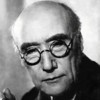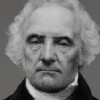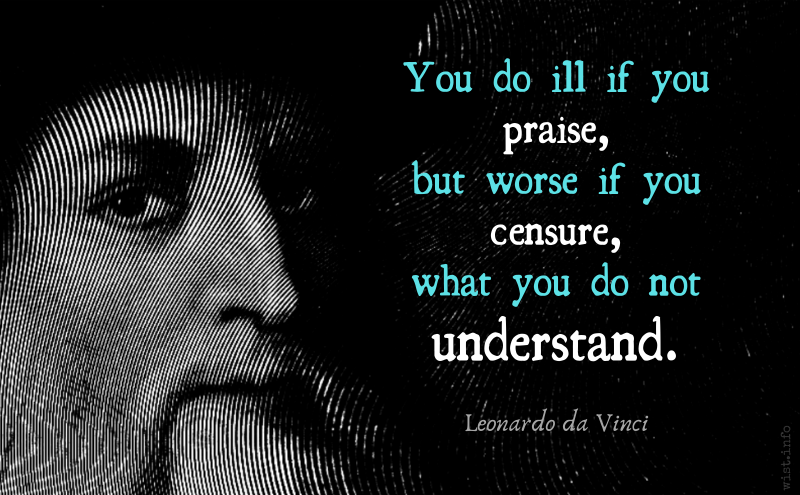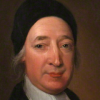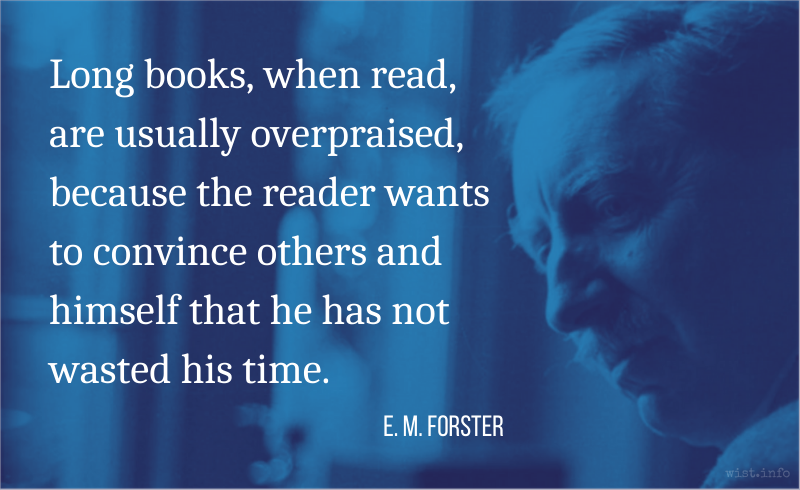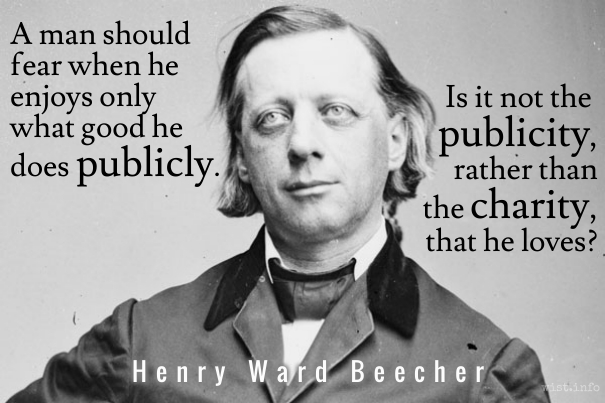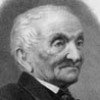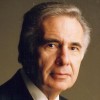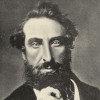What we do is never understood but always only praised or censured.
[Was wir thun, wird nie verstanden, sondern immer nur gelobt und getadelt.]
Friedrich Nietzsche (1844-1900) German philosopher and poet
The Gay Science [Die fröhliche Wissenschaft], Book 3, § 264 (1882) [tr. Kaufmann (1974)]
(Source)
Also known as La Gaya Scienza, The Joyful Wisdom, or The Joyous Science.
(Source (German)). Alternate translations:
What we do is never understood, but only praised and blamed.
[tr. Common (1911)]
What we do is never understood but always merely praised and reproached.
[tr. Nauckhoff (2001)]
Quotations about:
praise
Note not all quotations have been tagged, so Search may find additional quotes on this topic.
To found the reward for virtuous actions on the approval of others is to choose too uncertain and shaky a foundation. Especially in an age as corrupt and ignorant as this, the good opinion of the people is a dishonor. Whom can you trust to see what is praiseworthy?
[De fonder la recompence des actions vertueuses, sur l’approbation d’autruy, c’est prendre un trop incertain et trouble fondement, signamment en un siecle corrompu et ignorant, comme cettuy cy la bonne estime du peuple est injurieuse. A qui vous fiez vous, de veoir ce qui est louable?]Michel de Montaigne (1533-1592) French essayist
Essays, Book 3, ch. 2 “Of Repentence [Du Repentir]” (1586) (3.2) (1595) [tr. Frame (1943)]
(Source)
This essay first appeared in the 1588 ed. The second sentence/phrase (on the age being so corrupt) and following were added for the 1595 ed.
(Source (French)). Alternate translations:
To ground the recompence of vertuous actions, upon the approbation of others, is to undertake a most uncertaine or troubled foundation, namely in an age so corrupt and times so ignorant, as this is: the vulgar peoples good opinion is injurious. Whom trust you in seeing what is commendable?
[tr. Florio (1603)]
To ground the Recompence of virtuous Actions upon the Approbation of others, is too uncertain and unsafe a Foundation; especially in so corrupt and ignorant an Age as this, the good Opinion of the Vulgar is injurious. Upon whom do you relie to shew you what is recommendable?
[tr. Cotton (1686)]
To ground the recompense of virtuous actions upon the approbation of others is too uncertain and unsafe a foundation, especially in so corrupt and ignorant an age as this, wherein the good opinion of the vulgar is injurious: upon whom do you rely to show you what is recommendable?
[tr. Cotton/Hazlitt (1877)]
To base the reward of virtuous actions on the approbation of others is to choose a too uncertain and obscure foundation. Especially in a corrupt and ignorant age like this, the good opinion of the vulgar is offensive; to whom do you trust to perceive what is praiseworthy?
[tr. Ives (1925)]
Basing the recompense of virtuous deeds on another’s approbation is to accept too uncertain and confused a foundation -- especially since in a corrupt and ignorant period like our own to be in good esteem with the masses is an insult: whom would you trust to recognize what was worthy of praise!
[tr. Screech (1987)]
Oh cat; I’d say, or pray: be-ooootiful cat! Delicious cat! Exquisite cat! Satiny cat! Cat like a soft owl, cat with paws like moths, jeweled cat, miraculous cat! Cat, cat, cat, cat.
Doris Lessing (1919-2013) British author, biographer, playwright [b. Doris May Tayler]
Particularly Cats, ch. 5 (1967)
(Source)
COMMENDATION, n. The tribute that we pay to achievements that resemble, but do not equal, our own.
Ambrose Bierce (1842-1914?) American writer and journalist
“Commendation,” The Cynic’s Word Book (1906)
(Source)
Included in The Devil's Dictionary (1911). Originally published in the "Devil's Dictionary" column in the San Francisco Wasp (1881-08-05).
Compliments make me vain: & when I am vain, I am insolent & overbearing. It is a pity, too, because I love compliments. I love them even when they are not so. My child, I can live on a good compliment two weeks with nothing else to eat.
Mark Twain (1835-1910) American writer [pseud. of Samuel Clemens]
Letter to Gertrude Natkin (1906-03-02)
(Source)
In a similar vein, his biographer, Albert Bigelow Paine, in Mark Twain: A Biography, Vol. 4, ch. 250 (1912), recalled Clemens saying: "I can live for two months on a good compliment."
Nothing is so silly as the expression of a man who is being complimented.
André Gide (1869-1951) French author, Nobel laureate
Journal (1906-02-13) [tr. O’Brien (1947)]
(Source)
Guard against that vanity which courts a compliment, or is fed by it.
Thomas Chalmers (1780-1847) Scottish minister, theologian, political economist, church leader
Journal (1810-05-10)
(Source)
Great minds had rather deserve contemporaneous applause, without obtaining it, than obtain, without deserving it; if it follow them, it is well, but they will not deviate to follow it. With inferior minds the reverse is observable; so that they can command the flattery of knaves while living, they care not for the execrations of honest men, when dead.
Charles Caleb "C. C." Colton (1780-1832) English cleric, writer, aphorist
Lacon: Or, Many Things in Few Words, Vol. 1, § 6 (1820)
(Source)
And even when I reproach myself for it, the love of praise tempts me. There is temptation in the very process of self-reproach, for often, by priding himself on his contempt for vainglory, a man is guilty of even emptier pride; and for this reason his contempt of vainglory is an empty boast, because he cannot really hold it in contempt as long as he prides himself on doing so.
[[Amor laudis] temptat et cum a me in me arguitur, eo ipso quo arguitur, et saepe de ipso vanae gloriae contemptu vanius gloriatur, ideoque non iam de ipso contemptu gloriae gloriatur: non enim eam contemnit cum gloriatur.]
Augustine of Hippo (354-430) Christian church father, philosopher, saint [b. Aurelius Augustinus]
Confessions, Book 10, ch. 38 / ¶ 63 (10.38.63) (c. AD 398) [tr. Pine-Coffin (1961)]
(Source)
(Source (Latin)). Alternate translations:
[Love of praise] tempts, even when it is reproved by myself in myself, on the very ground that it is reproved; and often glories more vainly of the very contempt of vain-glory; and so it is no longer contempt of vain-glory, whereof it glories; for it doth not contemn when it glorieth.
[tr. Pusey (1838)]
[Love of praise] tempts, even when within I reprove myself for it, on the very ground that it is reproved; and often man glories more vainly of the very scorn of vain-glory; wherefore it is not any longer scorn of vain-glory whereof it glories, for he does not truly contemn it when he inwardly glories.
[tr. Pilkington (1876)]
[Love of praise] tempts, even when I condemn it in myself, and from the very fact that it is condemned; and often glories more vainly in the very contempt of vain-glory; and therefore it ceases to be contempt of vain-glory, whereof it glories; for it does not really contemn it when it so glories.
[tr. Hutchings (1890)]
Love of praise tempts me even when I reprove it in myself, indeed in the very fact that I do reprove it: a man often glories the more vainly for his very contempt of vainglory: for which reason he does not really glory in his contempt of glory; in that he glories in it, he does not contemn it.
[tr. Sheed (1943), 10.39]
[Love of praise] tempts me, even when I inwardly reprove myself for it, and this precisely because it is reproved. For a man may often glory vainly in the very scorn of vainglory--and in this case it is not any longer the scorn of vainglory in which he glories, for he does not truly despise it when he inwardly glories in it.
[tr. Outler (1955)]
Even when [love of praise] is rebuked within myself by myself, it affords temptation by the very fact that it is rebuked. Often, out of very contempt of glory a man derives an emptier glory. No longer, therefore, does he glory in contempt of vainglory: he does not despise it, in as much as he glories over it.
[tr. Ryan (1960)]
Indeed [the love of praise] tempts me even in the very act of condemning it; often in our contempt of vainglory we are merely being all the more vainglorious, and so one cannot really say that one glories in the contempt of glory; for one does not feel contempt for something in which one glories.
[tr. Warner (1963)]
[Love of praise] is a temptation, even when shown up by myself and in myself. "Shown up" is the right word. It often boasts emptily over its very scorn for empty boasting, which thus ceases to be the scorn of which it boasts. The boaster does not in truth despise it, when he boasts about it.
[tr. Blaiklock (1983)]
[Hankering for praise] is a real temptation to me, and even when I am accusing myself of it, the very fact that I am accusing myself tempts me to further self-esteem. We can make our very contempt for vainglory a ground for preening ourselves more vainly still, which proves that what we are congratulating ourselves on is certainly not contempt for vainglory; for no one who indulges in it can be despising it.
[tr. Boulding (1997)]
Nothing is meaner, and more typical of the mob, than to speak in glowing terms of those whom one held in little account before their rise to eminence.
[Il n’y a rien de plus bas, et qui convienne mieux au peuple, que de parler en des termes magnifiques de ceux mêmes dont l’on pensait très modestement avant leur élévation.]
Jean de La Bruyère (1645-1696) French essayist, moralist
The Characters [Les Caractères], ch. 12 “Of Opinions [Des Jugements],” § 5 (12.5) (1688) [tr. Stewart (1970)]
(Source)
(Source (French)). Alternate translations:
There's nothing so mean, and so like the Mob, as to talk much in the praise of those very persons, of whom we thought indifferently before their promotion.
[Bullord ed. (1696)]
There is nothing so mean and so like the Vulgar, as to talk much in praise of those very Persons, of whom we thought indifferently before their promotion.
[Curll ed. (1713)]
There's nothing so mean, and so truly vulgar, as to sound the Praise of those very Persons, of whom we thought but indifferently before their Promotion.
[Browne ed. (1752)]
There is nothing so mean and so truly vulgar as extravagantly to praise those very persons of whom we had but very indifferent opinions before their promotion.
[tr. Van Laun (1885)]
While rivers run into the deep,
While shadows o’er the hillside sweep,
While stars in heaven’s fair pasture graze,
Shall live your honour, name, and praise,
Whate’er my destined home.[In freta dum fluvii current, dum montibus umbrae
lustrabunt convexa, polus dum sidera pascet,
semper honos nomenque tuum laudesque manebunt,
quae me cumque vocant terrae.]Virgil (70-19 BC) Roman poet [b. Publius Vergilius Maro; also Vergil]
The Aeneid [Ænē̆is], Book 1, l. 607ff (1.607-610) [Aeneas] (29-19 BC) [tr. Conington (1866)]
(Source)
Expressing undying gratitude to Dido for taking him and his soldiers in. He will then marry Dido, desert her, and leave her to her suicide. At least he gets haunted by her ghost in the Underworld.
(Source (Latin)). Alternate translations:
Whilst convex'd hills have shadows, to the maine,
Whilst rivers run, whilst poles the stars sustaine,
Thy honour; name, and same, shall last, what land
So-ever me invites.
[tr. Ogilby (1649)]
While rolling rivers into seas shall run,
And round the space of heav'n the radiant sun;
While trees the mountain tops with shades supply,
Your honour, name, and praise shall never die.
Whate'er abode my fortune has assign'd,
Your image shall be present in my mind
[tr. Dryden (1697)]
While the rivers to the sea
Shall run, -- while mountain shadows move around
Their sides, -- and while the heavens shall feed the
stars. So long thy honor, and thy name and praise
Shall last, whatever lands may call me hence.
[tr. Cranch (1872)]
While rivers run into the sea, while the mountain shadows move across their slopes, while the stars have pasturage in heaven, ever shall thine honour, thy name and praises endure in the unknown lands that summon me.
[tr. Mackail (1885)]
Now while the rivers seaward run, and while the shadows stray
O'er hollow hills, and while the pole the stars is pasturing wide,
Still shall thine honour and thy name, still shall thy praise abide
What land soever calleth me.
[tr. Morris (1900)]
O, while the rivers run
to mingle with the sea, while shadows pass
along yon rounded hills from vale to vale,
and while from heaven's unextinguished fire
the stars be fed -- so long thy glorious name,
thy place illustrious and thy virtue's praise,
abide undimmed. -- Yet I myself must go
to lands I know not where.
[tr. Williams (1910)]
While rivers run into the sea, while on the mountains shadows move over the slopes, while heaven feeds the stars, ever shall thy honour, thy name, and thy praises endure, whatever be the lands that summon me!
[tr. Fairclough (1916)]
While rivers run to sea, while shadows move
Over the mountains, while the stars burn on,
Always, your praise, your honor, and your name,
Whatever land I go to, will endure.
[tr. Humphries (1951)]
So long as rivers run to the sea, and shadows wheel round
The hollows of the hills, and star-flocks browse in the sky,
Your name, your fame, your glory shall perish not from the land
Wherever I am summoned to go.
[tr. Day-Lewis (1952)]
While rivers run into the sea and shadows
still sweep the mountain slopes and stars still pasture
upon the sky, your name and praise and honor
shall last, whatever be the lands that call me.
[tr. Mandelbaum (1971), l. 852ff]
So long as brooks flow seaward, and the shadows
Play over the moutnain slopes, and highest heaven
Feeds the stars, your name and your distinction
Go with me, whatever lands may call me.
[tr. Fitzgerald (1981), l. 828ff]
While rivers run into the sea, while shadows of mountains move in procession round the curves of valleys, while the sky feeds the stars, your honour, your name, and your praise will remain for ever in every land to which I am called.
[tr. West (1990)]
Your honour, name and praise will endure forever,
whatever lands may summon me, while rivers run
to the sea, while shadows cross mountain slopes,
while the sky nourishes the stars.
[tr. Kline (2002)]
While rivers run to the sea, while shadows
Move over mountainsides, while the sky
Pastures the stars, ever shall your honor,
Your name, and your praises endure,
Whatever the lands that summon me.
[tr. Lombardo (2005)]
So long as rivers run to the sea, so long as shadows
travel the mountain slopes and the stars range the skies,
your honor, your name, your praise will live forever,
whatever lands may call me to their shores
[tr. Fagles (2006), l. 727]
While rivers flow to the seas and shadows cross the moutnain slopes, while sky pastures the stars, your honor and your name and praise will last for me, whatever country calls.
[tr. Bartsch (2021)]
Our profession is dreadful, writing corrupts the soul. Every author is surrounded by an aura of adulation which he nurses so assiduously that he cannot begin to judge his own worth or see when it starts to decline.
Leo Tolstoy (1828-1910) Russian novelist and moral philosopher
Letter to Nikolay Strakhov (1876)
(Source)
Quoted in Henri Troyat, Tolstoy (1967).
It is advantageous to an author, that his book should be attacked as well as praised. Fame is a shuttlecock. If it be struck at one end of the room, it will soon fall to the ground. To keep it up, it must be struck at both ends.
Samuel Johnson (1709-1784) English writer, lexicographer, critic
Comment (11-19 Nov 1793), in James Boswell, Journey of a Tour to the Hebrides (1785)
(Source)
Don’t be a man of “Intentions.” The world gives a man credit only for his deeds and, often, not even for them.
Minna Antrim (1861-1950) American epigrammatist, writer
Don’ts for Bachelors and Old Maids (1908)
(Source)
Nobody wants constructive criticism; it’s all we can do to put up with constructive praise.
Mignon McLaughlin (1913-1983) American journalist and author
The Neurotic’s Notebook, ch. 4 (1963)
(Source)
The way you win as a creative person is to learn to love the work and not the applause.
Bob Dylan (b. 1941) American singer, songwriter
(Misattributed)
Attributed to Dylan, but it actually appears to be from an article by Brian Herzog, "Don't Write for Applause" (28 May 2015), which touched on Dylan.
You are astonished to find yourself the butt of so much calumny, opposition, indifference and ill-will. You will be more so and have more of it; it is the reward of the good and the beautiful: one may calculate the value of a man from the number of his critics and the importance of a work by the evil said of it.
People ask you for criticism, but they only want praise.
W. Somerset Maugham (1874-1965) English novelist and playwright [William Somerset Maugham]
Of Human Bondage, ch. 50 (1915)
(Source)
It is better to be praised by another than by oneself.
[βέλτερον ὑφ’ ἑτέρου ἢ ὑφ’ ἑαυτοῦ ἐπαινέεσθαι.]
Democritus (c. 460 BC - c. 370 BC) Greek philosopher
Frag. 114 (Diels) [tr. Freeman (1948)]
(Source)
Original Greek. Diels citation "114. (117 N.) DEMOKRATES. 82." Freeman notes this as one of the Gnômae, from a collection called "Maxims of Democratês," but because Stobaeus quotes many of these as "Maxims of Democritus," they are generally attributed to the latter. The same translation is made by @sentantiq (2016).
Alternate translation: "It is better to be praised by others than by oneself." [tr. Barnes (1987)]
You do ill if you praise, but worse if you censure, what you do not understand.
Leonardo da Vinci (1452-1519) Italian artist, engineer, scientist, polymath
Notebook entry (c. 1500), Leonardo da Vinci’s Note-Books (1906) [tr. MacCurdy]
(Source)
Codice Atlantico 76 v. a.
Praise God, from whom all blessings flow!
Praise Him, all creatures here below!
Praise Him above, ye heavenly host!
Praise Father, Son, and Holy Ghost!Thomas Ken (1637-1711) English cleric, poet, hymnist
Doxology (1695)
This doxology was added at the end of Ken's Morning, Evening, and Midnight Hymns ("Awake, My Soul, and with the Sun," "All Praise to Thee, My God, This Night" (or "Glory to Thee, My God, This Night"), and "Lord, Now My Sleep Does Me Forsake." It is now often sung on its own in some Christian denominations, particularly Anglican.
Long books, when read, are usually overpraised, because the reader wants to convince others and himself that he has not wasted his time.
E. M. Forster (1879-1970) English novelist, essayist, critic, librettist [Edward Morgan Forster]
Commonplace Book (1985) [ed. Gardner]
(Source)
I never saw an author in my life — saving perhaps one — that did not purr as audibly as a full-grown domestic cat on having his fur smoothed the right way by a skillful hand.
His imagination resembled the wings of an ostrich. It enabled him to run, though not to soar. When he attempted the highest flights, he became ridiculous; but, while he remained in a lower region, he outstripped all competitors.
Thomas Babington Macaulay (1800-1859) English writer and politician
“John Dryden,” Edinburgh Review (Jan 1828)
(Source)
Review of John Dryden, The Political Works of John Dryden (1826)
We do what we must, and call it by the best names we can, and would fain have the praise of having intended the result which ensues.
Ralph Waldo Emerson (1803-1882) American essayist, lecturer, poet
“Experience,” Essays: Second Series (1844)
(Source)
You can tell the character of every man when you see how he gives and receives praise.
Seneca the Younger (c. 4 BC-AD 65) Roman statesman, philosopher, playwright [Lucius Annaeus Seneca]
Moral Letters to Lucilius [Epistulae morales ad Lucilium], Letter 52 “On choosing our teachers,” Sec. 12
(Source)
Why fight off fame now beating at your door?
What other writers dare to promise more?
You must make immortality start now,
Not make it wait to give your corpse a bow.[Ante fores stantem dubitas admittere Famam
Teque piget curae praemia ferre tuae?
Post te victurae per te quoque vivere chartae
Incipiant: cineri gloria sera venit.]Martial (AD c.39-c.103) Spanish Roman poet, satirist, epigrammatist [Marcus Valerius Martialis]
Epigrams [Epigrammata], Book 1, epigram 25 (1.25.5-8) (AD 85-86) [tr. Wills (2007)]
(Source)
"To Faustinus." (Source (Latin)). Some early writers number this as ep. 26, as noted. Alternate translations:
Wilt not admit fame standing at thy doore?
And take the fruit of all thy paines before?
Fame to the Urne comes late; let those Books live
With thee, which after life to thee must give.
[tr. May (1629), 1.26]
Dost doubt t'admit Fame standing at thy gate?
Thy labour's just reward to bear, dost hate?
That which will after, in thy time let live:
Too late men praise unto our ashes give.
[tr. Killigrew (1695)]
Fame at your portal waits; the door why barr'd?
Why loth to take your labour's just reward?
Let works live with you, which will long survive;
For honours after death too late arrive.
[tr. Hay (1755), 1.26]
Admit fair fame, who dances at thy door;
And dain to reap thyself thy toil's reward.
The strains that shall survive thee, give to soar;
Nor to thine ashes leave the late record.
[tr. Elphinston (1782), 2.34]
Do you hesitate to let in Fame when standing for admittance before your threshold, and does it grieve you to reap the rewards of your own diligence? May your poems, which will survive you, begin to live by your means. The glory which is shed upon ashes arrives full late.
[tr. Amos (1858), 1.26 "Posthumous Works"]
Do you hesitate to admit Fame, who is standing before your door; and does it displease you to receive the reward of your labour? Let the writings, destined to live after you, begin to live through your means. Glory comes too late, when paid only to our ashes.
[tr. Bohn's Classical (1859)]
If after thee thy verses are to live,
Let them begin whilst thou'rt alive. Too late
The glory that illumines but they tomb.
[ed. Harbottle (1897)]
Do you hesitate to admit Fame that stands before your doors, and shrink from winning the reward of your care? Let writings that will live after you by your adi also begin to live now; to the ashes of the dead glory comes too late.
[tr. Ker (1919)]
Nay, doth it irk you that reward is nigh?
Why bar out fame who standeth at the gate?
Give birth to what must live, before you die,
For honour paid to ashes comes too late.
[tr. Pott & Wright (1921)]
Fame stands before your threshold, let her in;
Are you ashamed your meed of praise to win?
Your books will long outlive you in their fame;
Come then, begin, for ashes have no name.
[tr. Francis & Tatum (1924), #14]
Tell me why you hesitate;
Fame is standing at your door.
Take the prize she long has offered,
Long has held for you in store!
Let works that will survive you after
You have trod the path so dread
Live now, while you still are living.
Fame comes too late to the dead.
[tr. Marcellino (1968)]
Fame is at the door,
and you keep her waiting.
You can't bring yourself to accept
the reward of your worry?
Hurry!
Let those pages begin to live -- show your face.
They will live on after you're gone in any case.
[tr. Bovie (1970)]
Do you hesitate to let Fame in when she stands at your door? Are you reluctant to take the reward for your pains? Your pages will live after you; let them also begin to live through you. Glory comes late to the grave.
[tr. Shackleton Bailey (1993)]
Amos (above) provides a number of examples where the last line has inspired other writers. Byron wrote, in the same vein, in "Martial, Lib. I, Epig. I" (c. 1821):
He unto whom thou art so partial,
O reader! is the well-known Martial,
The Epigrammatist: while living
Give him the fame thou wouldst be giving;
So shall he hear, and feel, and know it --
Post-obits rarely reach a poet.
Do not fancy, as too many do, that thou canst praise God by singing hymns to Him in church once a week, and disobeying Him all the week long. … Dost thou fancy as the heathen do, that God needs to be flattered with fine words? or that thou wilt be heard for thy much speaking, and thy vain repetitions? He asks of thee works as well as words; and more, He asks of thee works first and words after.
Charles Kingsley (1819-1875) English clergyman, historian, essayist, novelist (pseud. "Parson Lot")
The Good News of God, Sermon 4 “The Song of the Three Children (Daniel 3:16-18)” (1881)
(Source)
A man should fear when he enjoys only what good he does publicly. Is it not the publicity, rather than the charity, that he loves?
Henry Ward Beecher (1813-1887) American clergyman and orator
In Henry Ward Beecher and Edna Dean Proctor, Life Thoughts: Gathered From the Extemporaneous Discourses of Henry Ward Beecher (1858)
See Matthew.
I live my life in celebration and in praise of the life I’m living. What you focus on expands. The more you praise and celebrate your life, the more there is in life to celebrate. The more you complain, the more you find fault, the more misery and fault you will have to find.
Oprah Winfrey (b. 1954) American TV personality, actress
“Words of the Week,” Jet (27 Oct 1986)
(Source)
LADY MACBETH: Whither should I fly?
I have done no harm. But I remember now
I am in this earthly world; where to do harm
Is often laudable, to do good sometime
Accounted dangerous folly.William Shakespeare (1564-1616) English dramatist and poet
Macbeth, Act 4, sc. 2, l. 81ff (4.2.81-85) (1606)
(Source)
You should show the least vanity about your greatest gifts. Content yourself with doing: leave saying to others.
[Afecte menos sus mayores eminencias. Conténtese con hacer, y deje para otros el decir.]
Baltasar Gracián y Morales (1601-1658) Spanish Jesuit priest, writer, philosopher
The Art of Worldly Wisdom [Oráculo Manual y Arte de Prudencia], § 295 (1647) [tr. Maurer (1992)]
(Source)
(Source (Spanish)). Alternate translations:
Shew as little as thou canst thy most eminent qualities. Rest satisfied to doe, and leave it to others to talk of it.
[Flesher ed. (1685)]
The greater your exploits the less you need affect them: content yourself with doing, leave the talking to others.
[tr. Jacobs (1892)]
Real achievement needs no such affectation. Rest in accomplishment, and leave talk to others. Do, and do not brag.
[tr. Fischer (1937)]
Make the least ado about your greatest gifts. Be content to act, and leave the talking to others.
[Source]
The greatest pleasure I know is to do a good action by stealth, and to have it found out by accident.
Charles Lamb (1775-1834) Welsh-English essayist
“Table Talk, by the Late Elia,” London Athenaeum (4 Jan 1834)
(Source)
Praise, like gold and diamonds, owes its value only to its scarcity.
Samuel Johnson (1709-1784) English writer, lexicographer, critic
The Rambler, #136 (6 Jul 1751)
(Source)
Damn with faint praise, assent with civil leer,
And without sneering, teach the rest to sneer;
Willing to wound, and yet afraid to strike,
Just hint a fault, and hesitate dislike.
Let us believe neither half of the good people tell us of ourselves, nor half the evil they say of others.
Neither praise, nor dispraise thy self; thy Actions will do it enough.
Thomas Fuller (1654-1734) English physician, preacher, aphorist, writer
Introductio ad Prudentiam, Vol. 1, # 338 (1725)
(Source)
Accepting praize that iz not our due iz not mutch better than tew be a receiver of stolen goods.
[Accepting praise that is not our due is not much better than to be a receiver of stolen goods.]
When friends and acquaintances are telling you you are a genius, before you accept their opinion, take a moment to remember what you always thought of their opinions in the past.
Carl Icahn (b. 1936) American businessman and investor
In “The Best Financial Advice I Ever Got (or Gave),” Wall Street Journal (6 Jan 2014)
(Source)
You’re the top!
You’re the Colosseum.
You’re the top!
You’re the Louvre Museum.
You’re a melody from a symphony by Strauss,
You’re a Bendel bonnet, a Shakespeare sonnet,
You’re Mickey Mouse.You’re the Nile,
You’re the Tow’r of Pisa,
You’re the smile
On the Mona Lisa.
I’m a worthless check, a total wreck, a flop,
But if, baby, I’m the bottom
You’re the top!
For I know not why we should delay our tokens of respect to those who deserve them, until the heart that our sympathy could have gladdened has ceased to beat. As men cannot read the epitaphs inscribed upon the marble that covers them, so the tombs that we erect to virtue often only prove our repentance that we neglected it when with us.
Edward George Bulwer-Lytton (1803-1873) English novelist and politician
Letter to F. T. Mappin (25 Sep 1855)
(Source)
Quoted in The Illustrated London News, Vol. 27 (6 Oct 1855)
Carve not upon a stone when I am dead,
The praises which remorseful mourners give
To women’s graves — a tardy recompense,
But speak them while I live.
He that applauds him who does not deserve praise, is endeavoring to deceive the public; he that hisses in malice or sport, is an oppressor and a robber.
Samuel Johnson (1709-1784) English writer, lexicographer, critic
The Idler, #25 (7 Oct 1758)
(Source)
When the million applaud you, seriously ask yourself what harm you have done; when they censure you, what good!
Charles Caleb "C. C." Colton (1780-1832) English cleric, writer, aphorist
Lacon: Or, Many Things in Few Words, Vol. 1, § 183 (1820)
(Source)
Never fish for praise; it is not worth the bait.
James Burgh (1714-1775) British politician and writer
The Dignity of Human Nature, Sec. 5 “Miscellaneous Thoughts on Prudence in Conversation” (1754)
(Source)
Praise your friends, and let your friends praise you.
James Burgh (1714-1775) British politician and writer
The Dignity of Human Nature, Sec. 5 “Miscellaneous Thoughts on Prudence in Conversation” (1754)
(Source)
There are two modes of establishing our reputation: to be praised by honest men, and to be abused by rogues.
Charles Caleb "C. C." Colton (1780-1832) English cleric, writer, aphorist
Lacon: Or, Many Things in Few Words, Vol. 1, § 218 (1820)
(Source)






